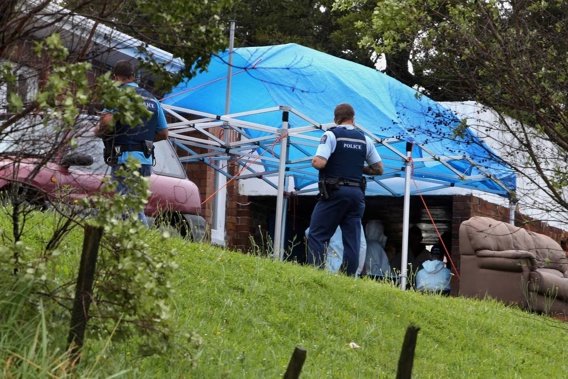

After more than six years locked up, two former meth cooks sentenced to extensive prison stints will soon be appearing before the Parole Board after the Court of Appeal quashed their minimum periods of imprisonment.
And their lawyer, who discovered their plight via word of mouth, says the men were caught up in addictions of their own and left to languish in prison despite showing remarkable rehabilitative potential.
Jaydean Riipia Hura and Mark James Lang were sentenced for their roles as meth cooks in a large-scale operation near Whangarei in 2016, headed by Head Hunters kingpin Brownie Harding.
The pair were battling methamphetamine addictions of their own when they become involved in the production.
At sentencing hearings in 2016, Hura was handed a nearly 17-year-long sentence, while Lang was imprisoned for just over 14 years for their roles in the lab. They have been in prison ever since.
Under New Zealand law, offenders sentenced to prison sentences of two years or longer typically become eligible for parole a third of the way through their sentence.
However, the Sentencing Act allows provision for a minimum period of imprisonment or MPI, also known as a non-parole period, to be extended in the interests of denunciation and protecting the community. Under the act, MPIs can be no longer than 10 years.
At the time the pair were sentenced, MPIs of 50 per cent of the end sentence was common for ‘commercial-scale’ methamphetamine offending. As such, at their respective sentencing hearings, both men were ordered by Justice Graham Lang to complete at least 50 per cent of their sentence before being considered for release.
It’s important to note that at the end of the period, offenders only become eligible to be considered for parole - not a guaranteed release.
But a landmark Court of Appeal judgment in 2019, R v Zhang, considered the legality of the blanket imposition of 50 per cent MPIs. The bench concluded that when ordering an MPI, a ‘reasoned analysis’ is required, based on the distinct features of the offending.
Sitting in prison, Hura discovered another prisoner in his unit had successfully appealed to have his MPI quashed. He sought the help of the same lawyer, Hunter de Groot, to take his appeal.
Lang went about his appeal in similar circumstances. Over a period of years he sought help from multiple lawyers and even Community Law - with no lawyer willing to take his case. He was given de Groot’s details by the same prisoner who encouraged Hura to appeal.
But there was a speedbump. Under New Zealand law, defendants have just 20 working days to file an appeal after the passing down of a sentence.
Both men claimed their appeals, some six years out of time, were a result of their previous lawyers being unwilling to challenge the sentence, or being unaware of the potential to appeal.
Justices’ Goddard, Woolford and Fitzgerald granted leave to appeal, taking into consideration the circumstances that prevented an appeal in the first place, namely the subsequent judgment on MPIs having not yet been made during the appeal window.
The judgment details the men’s journey in prison.
Hura, who had no secondary school education and was abusing drugs and alcohol by age 12, said he no longer has anything to do with the Head Hunters, but is yet to formally withdraw his membership which he says he will do when released.
At his sentencing, he was described as a ‘worthwhile, honest and hard-working employee’. He has a clean history in prison and is based in a unit classed as ‘minimal-low security’.
“It took a lot of internal working through for many reasons. Especially when being a member has kept me safe moving through different environments,” Hura told the court, referring to his journey away from gang life. His appeal stemmed from his desire to reenter the community and care for his daughter.
Lang is housed in his prison’s kaupapa Māori unit, where he attained the role of tohunga whakairo, or ‘master carver’. He has been involved in powhiri for visitors to the prison, including numerous cabinet ministers, and works as a mentor for other men.
He is described in the judgment as ‘trusted’, and has been off prison grounds on multiple occasions working on carving projects.
The court accepted the case put forward by de Groot, ruling that the standard MPI, a third of the sentence, was sufficient to hold Hura accountable for his offending.
“The promise [to make efforts to rehabilitate] that was apparent at the time his sentencing has been confirmed by Mr Hura’s conduct while in prison, and the significant rehabilitative progress he has made.”
The same conclusion was reached for Lang.
“The material before the Judge did not suggest that Mr Lang was likely to pose a material risk to the community after serving the standard MPI. To the contrary, there was reason to be optimistic that he would return to his former productive life,” the judgment states.
Both appeals were allowed and the MPI’s quashed.
De Groot, who acted for both men, said the men were offenders who had charted a course away from crime, but were heavily restricted by the MPI keeping them locked up.
“These are basically good and decent guys who, through their addiction, got drawn into drug offending,” he said.
“They have everything they can to rehabilitate. Continued mandatory imprisonment was achieving nothing for them and nothing for the community, except to run up huge costs. The decision means that their release is put in the hands of the Parole Board, where it belongs.”
The men are expected to appear before the Parole Board shortly.
- Ethan Griffiths, Open Justice

Take your Radio, Podcasts and Music with you









